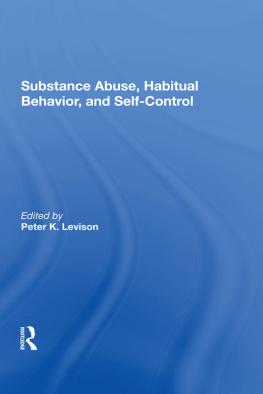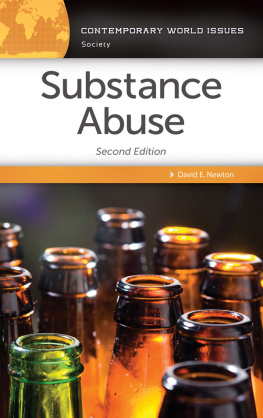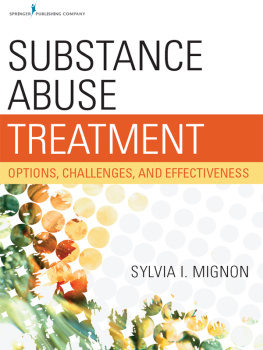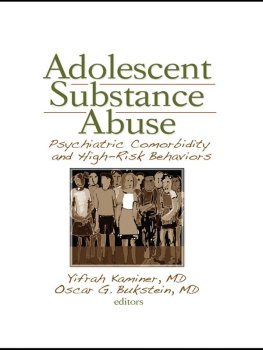First published 1984 by Westview Press
Published 2019 by Routledge
52 Vanderbilt Avenue, New York, NY 10017
2 Park Square, Milton Park, Abingdon, Oxon OX14 4RN
Routledge is an imprint of the Taylor & Francis Group, an informa business
Copyright 1984 by the American Association for the Advancement of Science
All rights reserved. No part of this book may be reprinted or reproduced or utilised in any form or by any electronic, mechanical, or other means, now known or hereafter invented, including photocopying and recording, or in any information storage or retrieval system, without permission in writing from the publishers.
Notice:
Product or corporate names may be trademarks or registered trademarks, and are used only for identification and explanation without intent to infringe.
Library of Congress Catalog Card Number: 83-51494
ISBN 13: 978-0-367-28914-0 (hbk)
About the Book
This collection of original essays by members of the National Academy of Sciences Committee on Substance Abuse and Habitual Behavior offers innovative perspectives on self-control over the use of habituating substances and related types of behavior. The authors review the powerful social-psychological influences of normative rules and interpersonal circumstances in developing individual capacities for self-control in, for example, the use of heroin. They also look at experimental contingencies under which animals engage in self-harming behavior; the induction of exaggerated consumption behavior, such as massive fluid drinking by laboratory rats; and studies of environmental and genetic influences on neurophysiological sensitivity to and preference for alcohol in laboratory mouse strains. The concluding chapter presents an unorthodox perspective on ways of self-governing the consumption of cigarettes and other substances, recognizing the peculiarities of the processes of human choice. In his introduction, volume editor Peter Levison contrasts the diverse approaches reflected in the book with the common-sense notion of self-control.
About the Series
The AAAS Selected Symposia Series was begun in 1977 to provide a means for more permanently recording and more widely disseminating some of the valuable material which is discussed at the AAAS Annual National Meetings. The volumes in this Series are based on symposia held at the Meetings which address topics of current and continuing significance, both within and among the sciences, and in the areas in which science and technology impact on public policy. The Series format is designed to provide for rapid dissemination of information, so the papers are not typeset but are reproduced directly from the camera-copy submitted by the authors. The papers are organized and edited by the symposium arrangers who then become the editors of the various volumes. Most papers published in this Series are original contributions which have not been previously published, although in some cases additional papers from other sources have been added by an editor to provide a more comprehensive view of a particular topic. Symposia may be reports of new research or reviews of established work, particularly work of an interdisciplinary nature, since the AAAS Annual Meetings typically embrace the full range of the sciences and their societal implications.
WILLIAM D. CAREY
Executive Officer
American Association for the Advancement of Science
Peter K. Levison , study director of the Committee on Substance Abuse and Habitual Behavior of the National Research Council, has primary research interests in the experimental analysis of behavior, especially the effects of drugs, psycho-therapy, and modifications in the environment. Currently he is a visiting research psychologist at the Walter Reed Institutes for Research. He is editor of several NRC reports on controlled-substance use and reduced tar and nicotine cigarettes .
Howard S. Becker is MacArthur Professor of Arts and Sciences in the Department of Sociology at Northwestern University. A former president of the Society for the Study of Social Problems, he is the author of Outsiders (Free Press, 1963).
P. B. Dews is Stanley Cobb Professor of Psychiatry and Psychobiology at Harvard Medical School. His research interests are behavioral physiology, pharmacology, and toxioology .
John L. Falk , professor of psychology at Rutgers University, has specialized in biopsychology. He has done experimental work on the excessive intake of alcohol, barbiturates, and minor tranquilizers, as well as other excessive behaviors .
Deborah Maloff , a sociologist by training, was research associate for the National Academy of Sciences Committee on Substance Abuse and Habitual Behavior. She has been involved in several studies of substance abuse and its control, including the influence of informal social controls on substance abuse, the impact of changing age-structure on consumption of alcohol, and the effects of marijuana decriminalization .
Gerald E. McClearn , a behavioral geneticist, is professor of human development, nutrition, and psychology; associate dean for research and graduate studies; director of the Institute for the Study of Human development; and chairman of the Intercollege Graduate Program in Genetics at the Pennsylvania State University. His primary research interests are the interrelationships of behavioral, pharmacological, and biochemical traits pertinent to alcohol.
Judith Rodin is professor of psychology and psychiatry at Yale University. A specialist in behavioral medicine, she has concentrated on eating behavior and obesity. She is the author of Exploding the Weight Myths (London Century Press, 1982 ), Health, Behavior, and Aging (edited with D. Parron and F. Solomon; Washington, D.C.: National Academy Press , 1981), and Obese Humans and Rats (with S. Schachter; Erlbaum/Halsted, 1974).
Thomas C. Schelling is Lucius N. Littauer Professor of Political Economy in the John F. Kennedy School of Government and professor of economics at Harvard University. His interests range from defense policy and energy policy to health policy, law enforcement, and behavior control. His books include The Strategy of Conflict (Harvard University Press, 1960) , Strategy and Arms Control (with Morton Halperin; The Twentieth Century Fund, 1961 ), Arms and Influence (Yale University Press, 1967) , Micromotives and Macrobehavior (Norton, 1978), and Essays in Economic Analysis (Harvard University Press, forthcoming).
 Published by Westview Press, Inc. 5500 Central Avenue, Boulder, Colorado
Published by Westview Press, Inc. 5500 Central Avenue, Boulder, Colorado American Association for the Advancement of Science 1776 Massachusetts Ave., N.W., Washington, D.C.
American Association for the Advancement of Science 1776 Massachusetts Ave., N.W., Washington, D.C.












